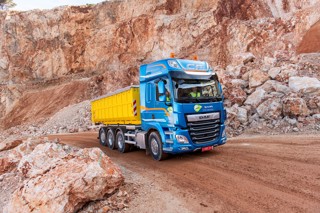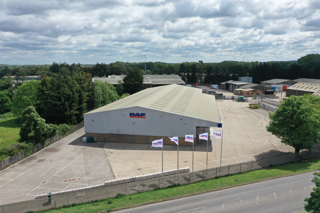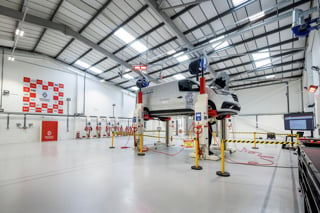Daf Trucks is forecasting the truck market to end the year at 32,000 new registrations, down 34% on 2019’s 48,535 and 18,000 below its original estimate for the year.
However, the UK’s biggest selling truck manufacturer is experiencing a “reasonably V-shaped recovery”, underpinned by strong demand from most business sectors.
Laurence Drake, Daf UK managing director (pictured), said: “Our labour hours are back to pre-covid levels and parts sales for the year will be within touching distance of last year’s number, which was a record.”
While lamenting “some of the most turbulent times seen in a generation”, Drake said the road transport industry “rose to the challenge”, although too many professional, hard-working and reputable companies had still gone under.
“However, it is also right to reflect on how this industry has demonstrated an adaptability and a responsiveness that others have failed to find,” he said. “Operators have redeployed trucks and staff, sometimes overnight, to serve other sectors and to keep wheels turning, goods on the move and food and pharmaceuticals on the shelves. Dealers and technicians pulled out all the stops to keep trucks on the road.”
The lockdown had provided insight into life with traffic-free roads, with emissions falling 60% from cars at the start of the national closure. However, by July they were 30% of normal levels and today just 10% below. Despite traffic starting to rise, the pandemic had showed that many people could work from home.
“Even at Daf Trucks, the figures are startling. Since the end of March, our business miles reduced by 450,000, saving approximately 134 tonnes of CO2 from being released into the atmosphere,” Drake said. “Through September, we are running at 10% of our pre covid mileage, effectively saving 24 tonnes of CO2.”
Reduction in traffic levels didn’t just benefit the environment; van and truck operators found it easier to distribute goods and services, which coincided with a spike in demand as more people started to order online for home delivery.
“Those doorstep deliveries do need some thought, as transport providers need to consolidate to avoid an associated rise in local traffic and environmental harm,” Drake said. “Surely there must be a price for this or an improved efficiency to mitigate the negative impacts.”
He called for industry and legislators to come together and find viable solutions, adding: “The environment is no less important than either the coronavirus or our economy. That balance we are seeking needs to account for all three often-competing objectives. No small feat but one we everyone needs to strive for.”
The nationwide focus on coronavirus had eclipsed Brexit as 2020’s biggest issue, although truck manufacturers are now turning their attention back to the ongoing trade talks.
Drake puts some of reason for the robust sales activity in the truck market down to the threat of a no deal and consequences of tariffs, adding that Daf is “in the fortunate position” of having a UK manufacturing plant at Leyland, Lancashire. Any tariffs imposed would be less impactful for imported components than whole vehicles, he explained.
Nevertheless, Drake added: “Truck prices are likely to increase once 2020 production slots are taken, especially if the pound devalues against the euro.”
Daf is preparing for potential issues around imports by increasing parts stock levels at dealers and at its distribution centre and is “confident” it can cope with “just about every eventuality”.





















Login to comment
Comments
No comments have been made yet.